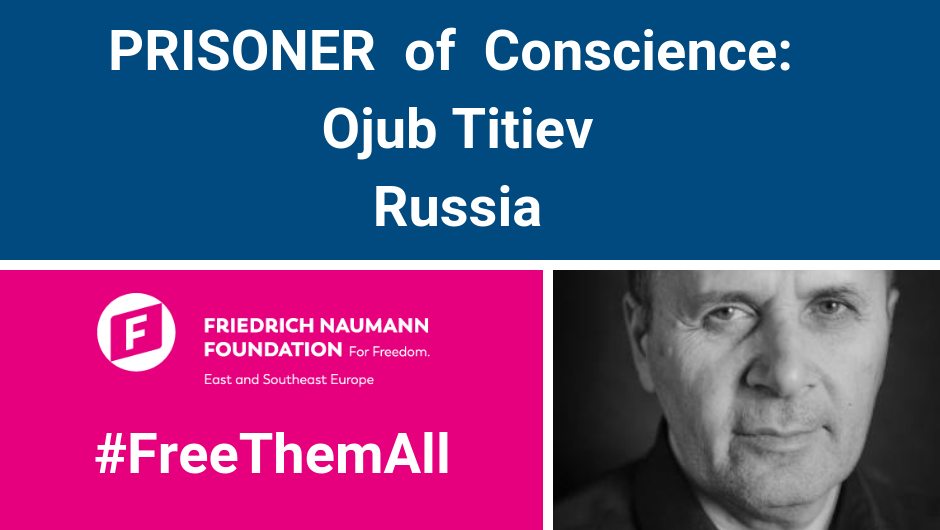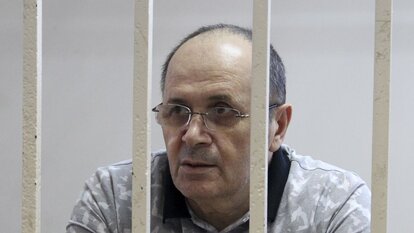Prohibition of Human Rights Advocacy in Chechnya

Ojub Titiev, Prisoner of Conscience
The conviction of Ojub Titiev marks the end of human rights work in the authoritarian Caucasus Republic in Russia's south.
Ojub Titiev – Head of human rights advocacy in Chechnya for Memorial, a partner of the Foundation, and nominee for the 2018 Boris Nemtsov Award – was sentenced to four years of corrective labour in the end of March. Formally, he has been convicted for possession of marijuana. Titiev asserts the drugs were planted. His lawyers claim the sentence is symbolic punishment for his work documenting human rights violations in Chechnya. The sentence illustrates the dithering of the Russian State apparatus in its handling of the increasingly totalitarian Caucasus Republic.
During a traffic stop in January 2018, according to the police, officers discovered ‘a plastic bag with plant matter smelling of marijuana’ in a search of Titiev's vehicle – a search that Titiev was not permitted to observe. Titiev was arrested for violation of Article 228(2) of the Russian criminal code – ‘illegal acquisition or storage of narcotic drugs or psychotropic substances’. Titiev pleaded his innocence and suggested that the bag was slipped into his car during the inspection. Alexander Cherkasov, Head of Memorial, claimed that Titiev was arrested in connection with his professional work, which had been ‘frowned on by the Chechen authorities’ for some time.
Working for Memorial, Ojub Titiev had been documenting human rights abuses in his native Chechnya since 2000. In particular, Titiev documented the violations during the bloody pogroms against Chechnya's homosexual community in 2017 – violations also documented by Yuri Guaiana, a liberal LGBTI activist, on behalf of ALDE, a political group that includes German FDP as one of its members. In his capacity as the Director of the OSCE's Office for Democratic Institutions and Human Rights, Michael Link, member of the German Bundestag and Chairman of the Friedrich Naumann Foundation, urged that ‘the authorities in the Russian Federation launch an investigation into the horrific reports of human rights violations against allegedly gay men in Chechnya as a matter of urgency, as well as identify, prosecute and punish any known perpetrator’. He also called on the authorities to ‘additionally adopt immediate protection measures for victims and vulnerable individuals who could become victims’.
When Western nations blamed Ramsan Kadyrov, President of the Chechen Republic, for the arrest, torture and murder of homosexual men in Chechnya and imposed sanctions such as travel bans and asset freezes, Kadyrov threatened retribution: ‘If I cannot go to Europe and to the West then, I declare, individuals calling themselves human rights activists no longer have the right to visit my own territory’. Although human rights organisations are subject to increasing pressure in other parts of Russia as well, a blanket entry ban of this kind is a deviation from Russian federal policy.
In 2015, Ramsan Kadyrov had made it clear that he has precious little tolerance for interference on the part of non-Chechen Russian bureaucrats in his region. Appearing on television, Kadyrov ordered that members of Russian security forces, ‘regardless of whether sent by Moscow or by Stavropol’, be shot at, if need be. Even though he did subsequently reaffirm his personal loyalty to Vladimir Putin, relations with the Russian authorities have remained tense. When Boris Nemtsov was murdered in February 2015 and the perpetrators turned out to be men with close personal ties to Kadyrov, Kadyrov originally promised to resign. Ultimately, however, Kadyrov remained unpunished, and the instigators of the murder remain officially unidentified to this day.

Ojub Titiev receiving his verdict
Observers in the Russian human rights community suspect that Ojub Titiev's sentence – four years' in a labour camp, with the possibility of early release after a third of the term has elapsed – may be due to a similar clash within State apparatus. While the court, under pressure from both Moscow and the international community, did not want to impose too harsh a sentence, it also did not want the Chechen authorities to lose face.
Igor Kochetkov, a member of Jabloko – a party that, like the FDP, is, in turn, a member of ALDE – remarked that ‘thankfully, the sentence is, in the end, relatively mild. But even so, the verdict makes it clear that Chechnya is turning into a no-go zone [for human rights activists]’. In 2018, Kochetkov had won the Award for Fostering Development of Civil Society for his work as the leader of the LGBT Network. The accolade is awarded by the Yegor Gaidar Foundation, another partner of the Naumann Foundation.
Sooner or later, the conflict between the Russian Federation's determination to enforce its laws and the increasingly totalitarian federal subject's desire for autonomy will inevitably to come to a head. Pessimists fear that Chechnya could be a pioneer among Russia's regions in terms of increasingly brutal implementation of mechanisms of oppression. Even though Ojub Titiev has been punished relatively mildly, his case is an unmistakable signal to all human rights organisations and is tantamount to a ban of human rights work in Chechnya.
Ojub Titiev has been identified as one of the Prisoners of Conscience from East and Southeast Europe, a new campaign of the Naumann Foundation in the region. Stay tuned for more freedom ambassadors, who are imprisoned because of staying true to the values of freedom and responsibility.